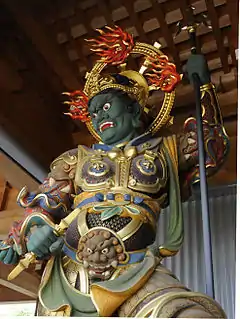Dhṛtarāṣṭra
Dhṛtarāṣṭra (Sanskrit; Pali: Dhataraṭṭha) is a major deity in Buddhism and one of the Four Heavenly Kings. His name means "Upholder of the Nation."
| Dhṛtarāṣṭra | |
|---|---|
 | |
| Sanskrit | धृतराष्ट्र
Dhṛtarāṣṭra |
| Pāli | धतरट्ठ
Dhataraṭṭha |
| Chinese | 持國天王
(Pinyin: Chíguó Tiānwáng) |
| Japanese | 持国天
(romaji: Jikokuten) |
| Korean | 지국천
(RR: Jiguk cheon) |
| Sinhala | ධෘතරාෂ්ට්ර |
| Thai | ท้าวธตรฐ
Thao Thatarot |
| Tibetan | ཡུལ་འཁོར་སྲུང Wylie: yul 'khor srung THL: Yulkhor Sung |
| Vietnamese | Trì Quốc Thiên |
| Information | |
| Venerated by | Theravāda
|
| Attributes | Guardian of the East |
Names
The name Dhṛtarāṣṭra is a Sanskrit compound of the words dhṛta (possessing; bearing) and rāṣṭra (kingdom; territory).[1] Other names include:
- Traditional Chinese: 持國天; Simplified Chinese: 持国天; pinyin: Chíguó Tiān; Japanese: Jikokuten; Korean: 지국천 Jiguk cheon; Vietnamese: Trì Quốc Thiên, a calque of Sanskrit Dhṛtarāṣṭra
- Traditional Chinese: 提頭頼吒; Simplified Chinese: 提头赖吒; pinyin: Títóulàizhā; Japanese: Daizurata; Korean: 제두뢰타; Vietnamese: Đề-đầu-lại-tra. This is a transliteration of the original Sanskrit name.
- Tibetan: ཡུལ་འཁོར་སྲུང, Wylie: yul 'khor srung, THL Yulkhor Sung, "Defender of the Area"
- Thai: ท้าวธตรฐ Thao Thatarot is an honorific plus the modern pronunciation of Pali Dhataraṭṭha.
Characteristics
Dhṛtarāṣṭra is the guardian of the eastern direction. He lives on the eastern part of Sumeru. He is leader of the gandharvas and piśācas.
Most East Asian depictions of Dhṛtarāṣṭra show him playing a stringed instrument, but the presence of this motif varies.
Theravāda
In the Pāli Canon of Theravāda Buddhism, Dhṛtarāṣṭra is called Dhataraṭṭha. Dhataraṭṭha is one of the Cātummahārājāno, or "Four Great Kings." each of whom rules over a specific direction.
He has many sons who go by the title "Indra, as well as a daughter named Sirī.[2]
Japan
In Japan, Jikokuten (持国天) is commonly depicted with a fierce expression. He is clad in armor, often brandishing a sword or trident spear while trampling a jaki.[3]
Nāga King
Although an entirely separate figure, Buddhist literature features a Nāga King also named Dhṛtarāṣṭra. He was the father of Gautama Buddha in a past life when the latter was a bodhisattva named Bhūridatta. His story may be found in the Bhūridatta Jātaka of the Pali Canon.[4]
He is also mentioned in several Mahāyāna Sutras, including the Mahāmāyūrī Vidyārājñī Sūtra and the Mahāmegha Sūtra.
References
- "Dhṛtarāṣṭra". Wisdom Library. Retrieved 2019-02-20.
- "Dhatarattha". Buddhist Dictionary of Pali Proper Names. Retrieved 2019-02-20.
- "Jikokuten 持国天". JAANUS. Retrieved 2019-02-20.
- "Bhuridatta Jātaka". Sutta Central. Retrieved 2019-02-22.
External links
 Media related to Dhrtarashtra at Wikimedia Commons
Media related to Dhrtarashtra at Wikimedia Commons

